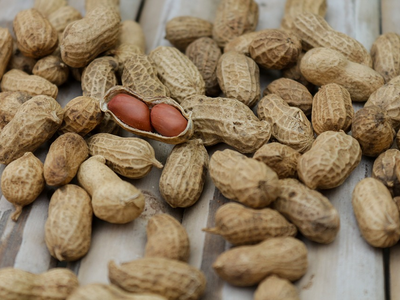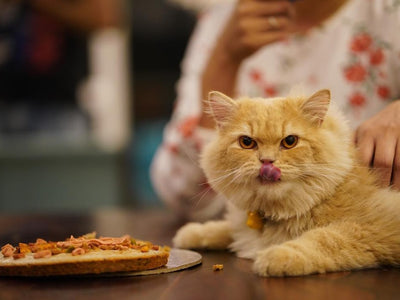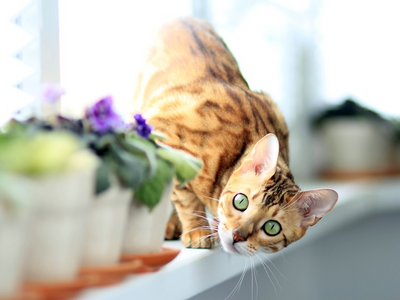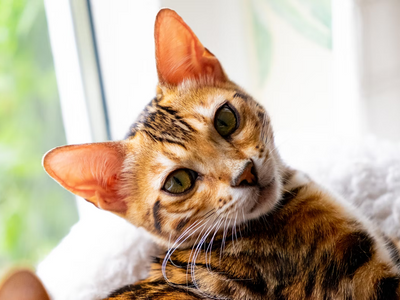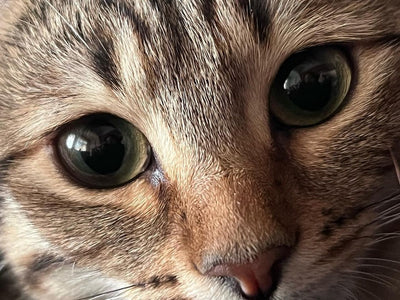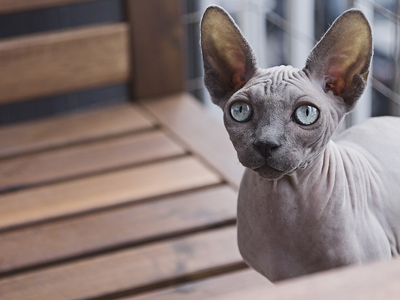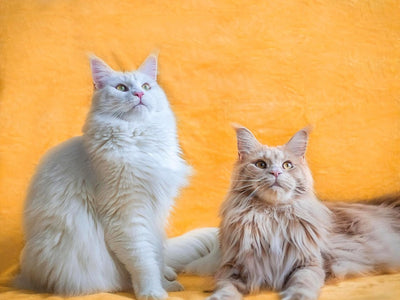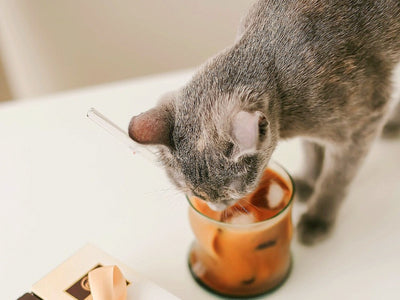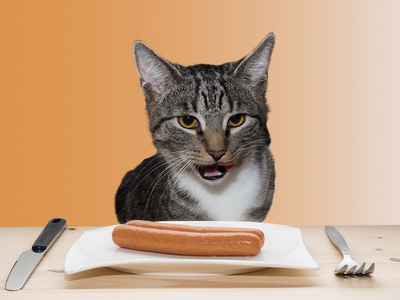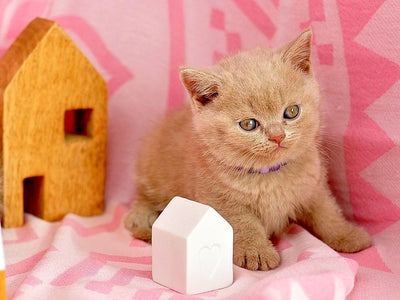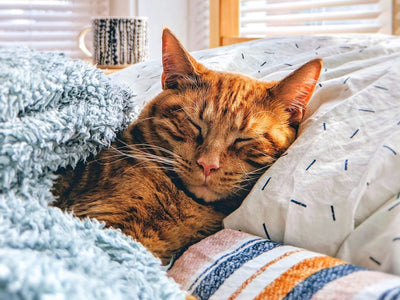16.07.2022
How much do Persian cats weigh?
All Persian cat parents want to keep their beautiful, flat-faced kitties healthy, happy, and fit. For this reason, weight maintenance plays a massive role in feline care.
This article will answer the following questions:
- How much do Persian cats weigh?
- What are the causes of obesity in these felines?
- How to spot if your cat is becoming overweight?
We’ll give you the tools to manage their weight efficiently and provide tips for a balanced Persian cat diet that’ll keep them fit and happy.
What's the average weight of a Persian cat?
An adult Persian cat typically weighs between 3–6kg, but each kitty is different. Your feline’s weight depends on their:
- Gender
- Age
- Genetics
Gender
Male felines typically weigh more than females. A healthy male Persian cat weighs around 4–6kg, while females reach 3.2–4.5kg.
Age
Your Persian’s weight will change more dramatically during kittenhood than in later years. The following table shows what you can expect from your kitten’s weight during the first two months:
|
Week |
Weight (in grams) |
|
First week |
50–150 |
|
Second week |
150–250 |
|
Third week |
250–350 |
|
Fourth week |
350–450 |
|
Fifth week |
450–550 |
|
Sixth, seventh, and eighth week |
550-850 |
During adulthood, your Persian should maintain a steady weight, while their senior years could bring about some weight gain due to a slower metabolism and less activity. It is also not uncommon for older cats to lose weight because the muscle mass tends to disappear.
Feed your feline nutritious meals to maintain a healthy weight at any life stage. If they’re losing or gaining weight suddenly despite an active lifestyle and a healthy diet, consult your vet to see if your Persian’s experiencing any health issues.
Genetics
Although a proper diet will usually trump genetics, your Persian’s ancestry can tell you a lot about what to expect from their size. The size and weight of their parents indicate how your cat will develop over the years.
How to know if your cat’s overweight?
Because of their long and fluffy coats, it might be hard to tell whether your Persian’s fat. After grooming or a haircut, check out these tell-tale signs to determine if your Persian has gotten chubby:
|
Body part |
Underweight |
Healthy |
Overweight |
Obese |
|
Ribs |
Visible bones that stick out and feel pointy |
Easily felt bones |
Barely palpable bones |
Fully concealed and impalpable bones |
|
Stomach |
Heavily pronounced abdominal tuck |
Slightly tucked abdomen |
Rounded |
Extremely rounded |
|
Waist |
Narrow |
Visible when viewed from above |
Barely visible |
Not visible |
|
Spine |
Sticking out and boney |
Not visible but palpable |
Not visible and hard to feel |
Not palpable at all because of a thick layer of fat |
Obesity can be tough on your cat’s joints and cause serious health issues, such as:
- Diabetes and pancreatitis
- Heart issues
- Hyperthyroidism
Paying attention to the above-mentioned indicators will help you spot potential weight gain or weight loss easier and alter your cat’s diet to fit their current needs.

Stop feeling my rib cage and give me some cuddles, hooman!
Source: dongwon3164
What causes weight gain in Persian cats?
Numerous factors affect your kitty's weight, including:
- Sterilisation status—Spayed and neutered felines’ metabolism usually slows down, leading to weight gain
- Inactive lifestyle—Mild-tempered and friendly Persian’s favourite leisure activity is taking a nap next to their cat parents. They’re prone to laziness and inactivity, so you must make playtime extra fun to get them to exercise
- Overfeeding—Indoor kitties don’t require more than 45 calories a day per kilo of their body weight. Despite their adorable pleading eyes and meows every time you step into the kitchen, you must resist the urge to give them too many treats
- Medical conditions—Feline obesity can be caused by hormonal issues (hyperthyroidism), Cushing’s disease, and gastrointestinal issues, including IBS and constipation
- Pregnancy—If your Persian cat has put on some weight—especially around her belly—and none of the other factors seems to be in play, she might be expecting kittens! Consult your vet for a definitive diagnosis

What do you mean I’m expecting? Expecting what? A tuna steak?
Source: pidepu
Keep a growth chart
Keeping a growth chart will help you spot any changes and abnormalities in your Persian’s weight.
You’ll be able to compare their results to the breed's average weight and spot any red flags early on. Here’s what you need for it:
- Spreadsheet—Making a spreadsheet to follow your Persian’s weight is an excellent way to gather all the necessary information in one place
- Scale—Use the same scale every time and weigh your Persian at the same time of day for consistency
- Measuring tape—Measure the width of your cat’s stomach, neck, bust, and extremities to keep track of their size
The importance of healthy weight maintenance
If your Persian has a strong appetite and doesn’t know when to stop eating, it’s only a matter of time before they start gaining weight. If you suspect they’re becoming chubbier, you should take action immediately.
Poor nutrition is the number one cause of weight issues in all felines. Not only does carb-rich food contribute to weight gain, but it also fails to deliver essential nutrients. Such products are also tough to digest and often cause tummy troubles.
A grain-free diet can help prevent or stop weight gain and keep your Persian fit as a fiddle.
How can you help your Persian cat maintain a healthy weight?
Two crucial factors in healthy weight maintenance are:
- Exercise
- Diet
Exercise
In the wild, cats used to run, climb, and chase prey. They’ve since been domesticated and don’t have to work for food, but you can still take advantage of your Persian’s hunting instincts during playtime to get them to exercise.
If you have trouble motivating your cat, provide them with fun toys, such as:
- Balls and feather dancers
- Laser pointers
- Moving mice
Dedicate at least 30 minutes a day to playtime, as it is an excellent opportunity to connect and bond with your furry friend.
Food puzzles are also great for making your Persian cat exercise, have fun, and eat slowly. They’ll likely feel full with less food if they take time to savour it.
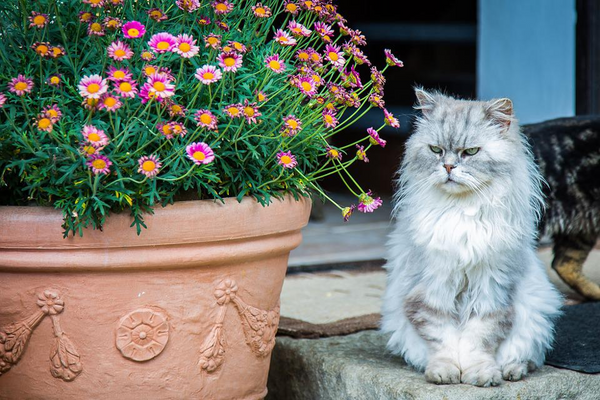
Can you imagine they told me to go out and exercise?
Source: maxmann
A proper diet
To ensure a healthy weight, you should promote proper eating habits in terms of quality and quantity. Feeding your Persian appropriate portions of high-quality, protein-rich food is the best way to prevent weight gain.
Check out how many calories your Persian should consume daily depending on their weight in the following table:
|
Cat weight |
Cats of normal weight |
Cats who gain weight easily |
Overweight cats |
|
2.5 kg |
183 kcal |
131 kcal |
105 kcal |
|
3.5 kg |
245 kcal |
175 kcal |
140 kcal |
|
4.5 kg |
303 kcal |
216 kcal |
173 kcal |
|
5.5 kg |
362 kcal |
258 kcal |
207 kcal |
|
6.5 kg |
413 kcal |
295 kcal |
236 kcal |
Feeding your Persian for healthy growth
Even though your Persian cat no longer hunts prey, such as rodents, frogs, rabbits, and birds, their diet should respect their natural feeding patterns to ensure healthy and consistent weight.
Persians are obligate carnivores, so they should get most of their calories from high-quality meat and fish to satisfy their nutritional needs. There are no vegans in the cat world, so fruits and veggies have no place in your feline’s meal plan.
Cats require healthy nutrients to stay energised. Two essential ingredients in cat food are:
- Animal protein
- Animal fat
Animal protein
Protein contains amino acids, such as taurine and arginine, which:
- Deliver energy
- Build muscle mass
- Maintain organ function
- Promote healthy skin and coat
Meat and fish contain essential amino acids, while vegetables are an inefficient protein source.
You can view the biological values of popular protein sources in cat food in the table below:
|
Protein type and source |
BV |
|
Animal protein: |
Between 88% and 98% |
|
Vegetable protein: |
Between 45% and 68% |
Plants are also hard to digest, and your cat would need large portions to fulfil their dietary requirements, which would inevitably lead to unhealthy weight gain.
Animal fat
Animal fat is rich in essential fatty acids that help:
- Maintain cell structure
- Reduce inflammation
- Maintain healthy skin and coat
Fat also tastes delicious to felines. High-quality cat jellies and gravies typically contain adequate amounts of animal fat to make even the most finicky eaters who turn their noses up at wet food run to their bowls.
Whichever type of food you choose (wet, dry, raw, semi-moist, or homemade), make sure that the formula contains moderate amounts of fat (not more than 20%) to tickle your Persian’s taste buds.
Can Untamed keep your Persian’s weight under control?
For the health and longevity of Persian cats, there’s no better choice than Untamed!
With twice as much animal protein as the industry standard, each Untamed recipe—Chocka Chicken, Tuck-In Tuna, or Full-On Fishy—is made to give your Persian:
- Enough energy to grow properly and stay active
- Vitamins and minerals for healthy bodily functions
- Superb taste to keep them happy
We formulated our recipes in collaboration with vets to ensure they:
- Contain zero known allergens—Our products are safe for sensitive and allergy-prone Persians
- Are made from human-grade ingredients—We don’t use meat derivatives or slaughterhouse scraps
- Provide the best nutrition for every life stage—From kittenhood to adulthood and golden years, your cat will get exactly what they need
Untamed is also determined to make the planet a better place for felines and humans everywhere, so we use:
- 100% recyclable packaging
- Ethically-reared meat and sustainably caught fish
Want your Persian to be fit and cheerful? Try Untamed and witness the change a good diet can make!

Untamed—the purrrfect way to make your Persian a lean, mean, nibbling machine.
Image (c) Untamed
Getting Untamed for your Persian cat
Treat your fluffy kitty to the healthiest and yummiest feast! You can switch them to Untamed in three simple steps:
- Tell us about your Persian
- Select the products
- Order your trial pack
Your cat food delivery will arrive in a day, and your Persian can start sampling Untamed’s menu right away. Once they’ve picked their favourites, we’ll keep you stocked with monthly supplies so you never run out.
According to satisfied Persian cat parents who have let their kitties go Untamed, you should notice the following improvements:
|
Timeline |
The Untamed effect |
|
In a week |
|
|
After two months |
|
|
Within four months |
|
|

![Associated image for What human food can Sphynx cats eat? [Comprehensive list]](http://untamed.com/cdn/shop/articles/what_human_food_can_sphynx_cats_eat_Featured_400x300_crop_center.jpg?v=1648705074)
